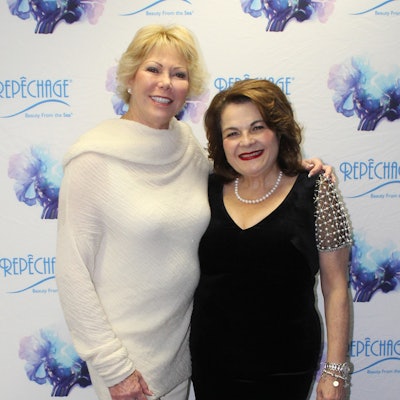 [Image: Deborah Carver, CEO of Creative Age Publications and Lydia Sarfati Repêchage President and CEO ]
[Image: Deborah Carver, CEO of Creative Age Publications and Lydia Sarfati Repêchage President and CEO ]Top of their list? Make sure you’re on the social media and digital bandwagon. “Word of mouth is the most powerful gold standard of marketing for our industry,” explained Hairbrained CEO Gordon Miller in his “Decoding Social Media: The Big Ideas and Practices Driving Success” presentation. Not only do potential clients look to your social media and review sites to make decisions about your business, he pointed out, but so do your future employees. Miller also spoke about the need to understand the fine line between work and personal posts, the importance of sticking to professional cohesive branding, and how the platforms are a means for storytelling. “Social media is all about telling stories—and brands are built on storytelling,” he said. He encouraged guests to always upgrade their phones and train staff on the latest devices; appropriately allocate marketing resources; know their audience and be on the platforms where that audience spends its time; and to be discoverable. “Being found is everything. You should be putting up content and getting people to react to that content,” he shared. Think: interesting, engaging posts that speak to your audience, with promotional posts every so often. “It’s not about hardcore promotions but rather a mix of content, which is your greatest source of marketing.” When it comes to social media, it’s advisable to track your results to see which posts get the most audience engagement. “You need to understand where you are, where you want to be and then adjust the plan,” Miller noted.
RELATED: 8 Strategies to Boost Your Spa’s Online Product Sales
Stacie Bowie, owner of Bowie Salon & Spa in Seattle, revealed that her business boomed when she implemented a “no cell phone policy” for her staff. “They could better anticipate their clients’ needs, plus there was a rise in upsells and retail sales,” she explained. “Clients deserve to be heard, looked at and talked to when employees are with them, and they don’t get that if they’re glued to their phones.” But how do you convince your staff to buy in? Tell them you want your salon to be 100 percent customer-focused and they should want the same, she advises. “It’s all about customer service and giving 100 percent—and how can you give that if you’re on your phone 50 percent of the time?”
RELATED: How to Market Your Spa on a Budget
When Repêchage president and CEO Lydia Sarfati first took to the podium she became teary-eyed when she told guests about how she has taken the road less travelled in her business pursuits, which hasn’t always been the easiest route. She then discussed the need for business owners to understand their clientele and present correct image in their marketing. “We say we shouldn’t judge a book by its cover but we do: Image is everything.” First and foremost, all employees should look presentable. “If you have bed head and look like hell why would I want to buy anything from you?” she questioned. “Estheticians should project an image of beauty, health and wealth.” Keep up the positive energy and always treat customers like VIPs. “Never forget that clients are king,” she told us. “You have to give them what they want, how they want it and when they want it.” Details are key: impeccable retail displays; ironed robes and sheets; friendly staff who are team players; proper phone etiquette; welcoming customers in the salon with cheery greetings; and ensuring customers can visibly catch a glimpse of the services you offer. “People want what they can see and hear, so stop hiding!” implored the industry veteran. Additional strategies on Sarfati’s docket: Profile your customers so you can cater to their wants and needs; host in-salon events to get clientele into the salon so they buy products from you instead of online; affiliate with like-minded businesses in your community; and amp up training your staff on massages. “We have the license to touch and that’s one of the most important factors in the services we provide,” she said. “This is what clients will come to get because they can’t buy massages on the internet.” Sarfati also stressed the importance of taking the fear out of retail recommendation. “The word ‘no” has never killed anyone! It only means you haven’t provided information that the customer wanted to hear, so you just have to come at it in a different way.”
—by Molly Church
![[VIDEO] An Osmosis Facial Infusion Treatment Step-by-Step](https://native-x.imgix.net/allured/663137812f619a000179e394/Thumbnail-Sized.jpg?crop=focalpoint&fit=crop&fp-x=0.5&fp-y=0.5&h=191&w=340&auto=format%2Ccompress&q=70)










